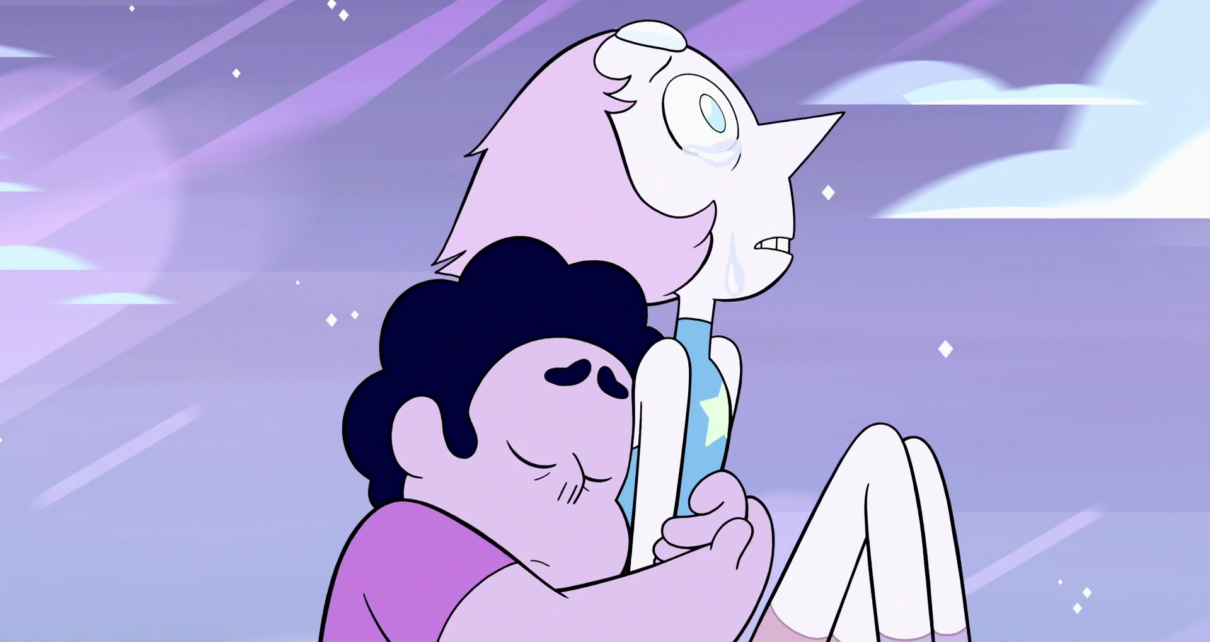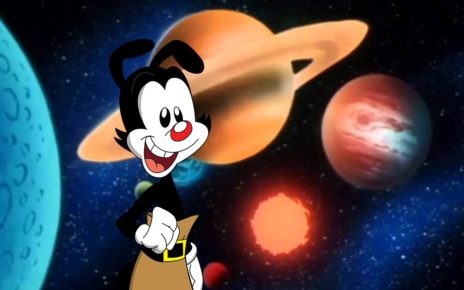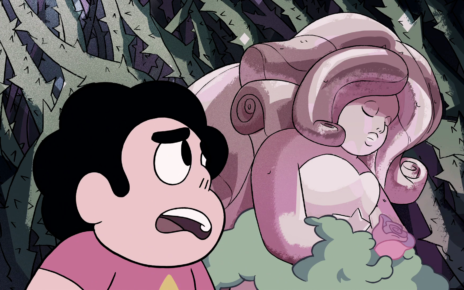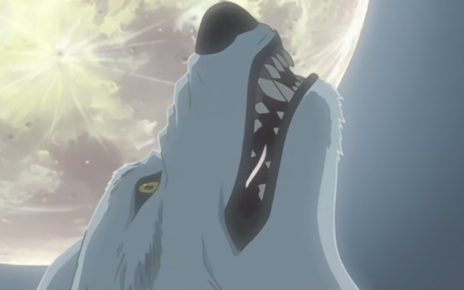In Toni Morrison’s Song of Solomon—my favorite novel—there lived a woman named Pilate Dead. (Morrison makes much of names.) The aunt of protagonist Macon “Milkman” Dead, she is a unique woman: a wise old bootlegger living together with her daughter and granddaughter in a shack, she wears her name in a box dangling from a wire through her ear, has no navel, and believes her ancestor, Shalimar called Solomon, could fly. (He could.) She also serves as both her nephew’s and the book’s moral compass.
In the book’s final pages, as Pilate lies dying in Milkman’s arms, she utters words that have served, since I first finished the book, as bedrock for my personal code of ethics:
“I wish I’d a knowed more people. I would of loved ’em all. If I’d a knowed more, I would a loved more.”
In Rebecca Sugar’s Steven Universe—my favorite television show on air—there lives a boy named (what else?) Steven Universe. (Sugar, too, makes much of names.) The son of a human being named Greg Universe and an alien named Rose Quartz, Steven is a unique boy. He’s an ebullient pre-teen living with his mother’s alien friends and former war comrades—rebellious members of the genderless, but female-coded, Gem race who call themselves the Crystal Gems—in a house below an ancient temple. He rides a pink lion. He has his mother’s pink gem for a navel, and can use it to project a pink shield and pink protective bubble. And, like his mother, he can fly. (Well, float.) He also serves as both his friends’ and the show’s moral compass.
Steven is protective, compassionate, mindful, and loving to a fault. He lives, with nearly every action he makes, Pilate’s credo.
Steven Universe is my ideal me.
Let’s back up a bit to be clear from the start: I identify with Steven Universe. A lot.
Steven’s mother, Rose Quartz, gave up her corporeal form in order to bring him to life, and Steven—with the physical reminder of his mother’s sacrifice embedded within his bellybutton—spends much of his life in her shadow. And what a large shadow it is.
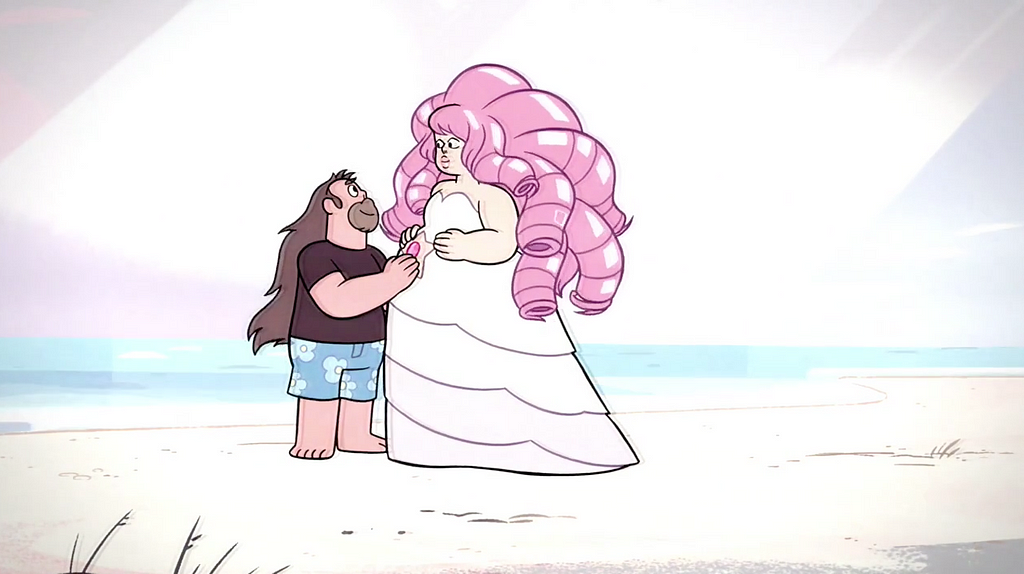
Rose was the leader of the Crystal Gems during their rebellion against the Gem Homeworld, which intended to colonize Earth for its own purposes and destroy nearly all endemic life in the process. Most Gems had no qualms about ruining the planet and wiping out its denizens. But Rose, who is consistently described as a beacon of empathy by both Greg and her former comrades, Garnet, Amethyst, and Pearl, couldn’t stomach the thought. She fought and shattered her former ruler, Pink Diamond, then led the Crystal Gems in battle against the Homeworld for a thousand years before, at great cost to both sides, the war was finally won. Then, more than 5,000 years later, Rose met Greg and fell in love. Their union resulted in Steven, who lives with Rose’s inner circle of most trusted friends, and is told constantly of his late mother’s bravery, compassion, and love—even as he is reminded, however gently or unknowingly, that his existence itself is the reason she’s gone. That’s a hell of a lot to live with.
I was five years old when my biological mother died, but my memory began with her death. (I am, of course, not the only person who’s had to cope with this.) While my circumstances are obviously different from Steven’s, the effect is the same. Survivor’s guilt is real, and there is a peculiar form of that guilt, I think, that crops up in a person who loses his or her mother at a young age. Maternal love is both mythologized and simplified in our patriarchal society, but behind all the sentiment and symbolism with which we imbue that love do lie certain inevitable traits. Maternal love is nurturing and protective, abundant and, at least theoretically, unconditional.
What reaction, then, is more natural than for the surviving child to attempt to emulate that love in every way possible—especially when every tale of that child’s mother paints her as a saint, a hero, a standard by which others’ goods are judged?

As it is for Steven, so it was for me. My grandparents never fail to note, upon my visits, how I have her face, her hair, her eyes. Her wake, I am told, left a line of visitors wrapped around two blocks adjacent to the funeral home, so great was the impression her kindness left upon those she knew. And like Steven living with the Crystal Gems, I was left surrounded by the best of people: a father who raised two kids alone for three years and, once those three years were done, an adoptive mother whose ability to raise another woman’s children as her own—and to make them her own, through time and dedication and love and a manner of generosity of spirit I may never understand myself—leaves me with a gratitude I find nearly impossible to articulate and a sort of awe that feels, sometimes, like it doubles as shame.
How could I ever measure up? Only, it seemed, through love.
It’s pretty hard, while watching Steven Universe as a recovering English major, to miss the show’s thesis: Loving, supportive, understanding relationships make a person strong and a life worth living. For someone like me, whose default method of knowing a person is to pour all the love I have into them at any given moment, it is inspiring and validating. It is also, in terms of how one can actually do that without becoming utterly emotionally spent, illuminating.
Loving isn’t always easy. The people we care about have flaws and failures. They can be cruel or apathetic, smug or selfish. Often, they let us down. Human beings are, to put it simply, imperfect—as are Gems.
In “Rose’s Scabbard,” one of the show’s most touching episodes, Steven is forced to learn just this lesson. Steven and the Gems visit an ancient battlefield from the rebellion in order to gather some of the weapons left by fallen Gems. There, Steven’s lion sniffs out Rose’s old scabbard from amidst the wreckage, and Pearl—who is never quite able to hide her unrequited love for her former leader—half-heartedly relinquishes it to Steven before excitedly dragging him along in search of its missing sword. “Rose had a place,” Pearl tells a wide-eyed Steven, “that she kept hidden from all but me. But you have her gem! That place is yours now!”
Once Pearl brings Steven to Rose’s sanctuary, she’s dismayed to discover that he has been there before, thanks to Lion. She’s even more disturbed once Steven reveals that the sword was hidden in Lion’s mane, which operates as a bag of holding of sorts. Learning, finally, that Rose kept secrets even from her, she lashes out at Steven as he tries to reassure her that Rose was probably just trying to keep Pearl safe.
“What do you know?” she screams. “You’ve never even met her!” She runs off sulking, nearly destroying a portrait of Rose Quartz in the process. Steven wipes away a tear before turning to Garnet: “Garnet? Is she OK?”
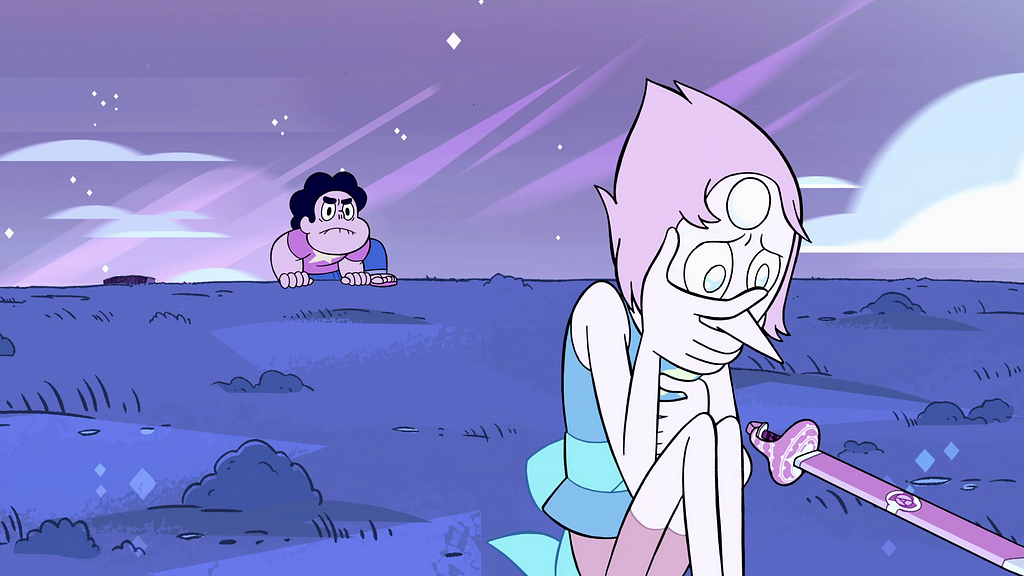
Steven chases Pearl down, and in spite of her insistence on running away and refusal to help him when he almost falls to his death chasing her, he still only cares about how she feels. “Pearl! Did I do something wrong?” he cries “You’ve gotta tell me!” And upon Pearl’s confession that she’s haunted constantly by Rose’s loss, worried that Rose would look down upon the Gem she has become, Steven throws himself at her.
“Well,” he says, “I think you’re pretty great.”
Steven’s expression of love here is utterly selfless, to the point of recklessness. In a scenario where many, myself included, would (justifiably!) brood over Pearl’s reaction or react in anger at a callous dismissal of parental loss, Steven can only worry about her. And by episode’s end, during a gorgeous montage, he attempts to entertain and comfort her with a series of objects he pulls from Lion’s mane — including Rose’s old battle flag.
The episode’s finale, while bittersweet, shows exactly the sort of power Steven’s compassion contains. His love is the adhesive that holds his world together. It is, in a word, everything.
This is the sort of love I identify with—huge and endlessly giving, to the point where it’s nearly self-sacrificing. Ensuring that it doesn’t veer into unnecessary self-sacrifice is the trick. My tendency, like Steven’s, is to try to see only the good in everyone I meet, and to love them accordingly. When, inevitably, I’m burned by a person who doesn’t reciprocate that kind of love, my tendency is to withdraw into self-pity and emotional self-flagellation. The loss, always, feels like a rebuke to my self-worth, which I often find debatable in the first place. When all you are is love, its absence feels like a loss of self.
But here’s the catch: Steven’s love is self-love, too. In “Sworn to the Sword,” Steven’s best human friend, Connie, begins sword training with Pearl, whose unthinking love for Rose is displayed in a dogged attempt to get Connie to “do it for him”—to sacrifice herself in battle, if need be, as long as it keeps Steven safe. Steven sees this and intervenes, joining a sparring session with Connie bearing his own weapon, which he can summon from his mother’s gem: Rose’s shield. The shield is Steven’s love made manifest, maternal and protective. He uses it to keep Connie safe from harm, but with it, he also shields himself — a consequence that proves particularly moving when considering its origin. The episode serves as a lesson in teamwork, but it holds, too, another lesson, one that sounds just a bit like gospel: In order to truly love others, you must also love yourself.
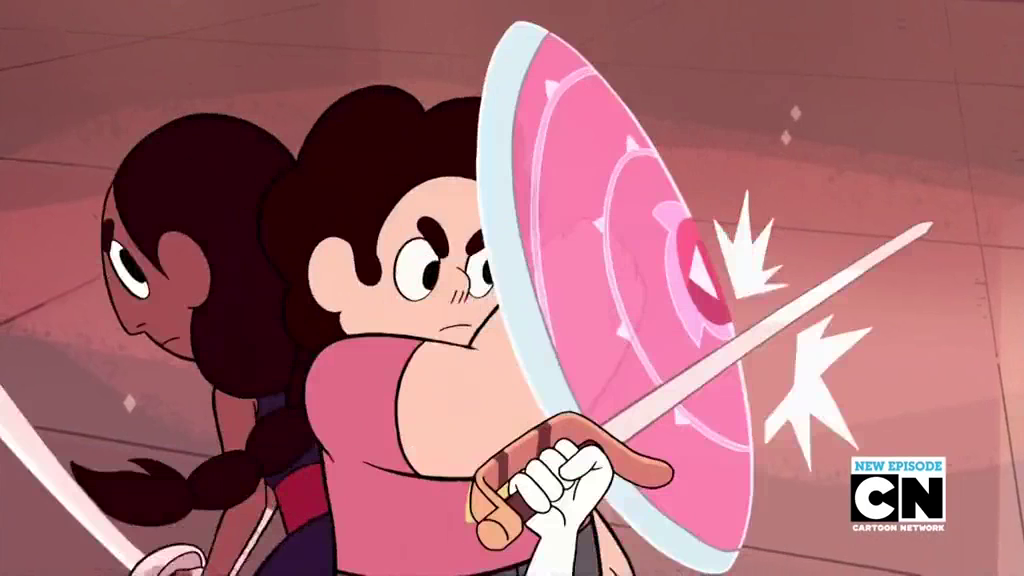
It’s not an easy lesson for anyone to learn, and for those burdened with survivor’s guilt or trauma, it’s even harder. Self-love is the aspect of love I’ve always found trickiest. In fact, for many sufferers of trauma, self-love feels impossible, its absence almost inevitable.
But maybe it doesn’t have to be. Maybe it’s a thing that can, against all odds, be taught, even by a children’s television show. Maybe self-love is just a reminder that those you love who love you back are proof that you, too, are worthy of care. Maybe self-love is just the awareness that, without taking care of you, there’s no you left to love the rest. Maybe we who love with abandon, who love because we don’t know what else to do with all the feelings and compassion that surge within us, can remember what it was like to learn to love in the first place, and, with it, learn anew. Maybe a cartoon boy can teach a twenty-something man what love really looks like. And maybe all of us can know more people, as Pilate wished. Maybe we can love ’em all, and do it right.
Maybe, Steven, we could even learn how to love like you.
Thanks for reading The Dot and Line, where we talk about animation of all kinds (and our feeeeelings). Don’t forget to ❤ this article and follow us on Twitter and Facebook.


